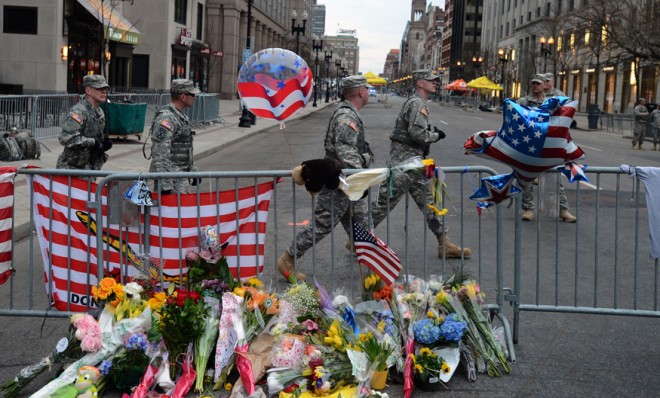Why the Taliban are aggressively disavowing the Boston Marathon bombing
Members of the Islamist group have been at war with the U.S. for more than a decade, but want everyone to know they had nothing to do with this attack


A free daily email with the biggest news stories of the day – and the best features from TheWeek.com
You are now subscribed
Your newsletter sign-up was successful
The Taliban didn't waste any time after the Boston Marathon bombs exploded before they publicly declared that they had nothing to do with the attack, which killed three people and wounded more than 160. On Tuesday, a spokesman for the Taliban in Pakistan, Ehsanullah Ehsan, said nobody in the Islamist insurgent group was involved. "We believe in attacking U.S. and its allies," he said, but "we have no connection to this bombing."
Other Taliban leaders disavowed the Boston attack far more forcefully, saying that any gloating by Islamists about the carnage would turn the bombings into a nightmare for the Taliban, even if the culprit or culprits turned out to be homegrown American terrorists. "You won't find any link with Afghanistan to the Boston attack," a former senior Taliban cabinet minister tells The Daily Beast. "The Taliban neither has the inclination nor the capacity for such an attack on the West."
It seems counterintuitive. But it actually makes sense that the Taliban are desperate to avoid being associated with the strike, say Sami Yousafzai and Ron Moreau at The Daily Beast. "Senior Taliban officials say such attacks on the West are counterproductive," the writers say, "and they fear that such actions can only hurt the Taliban's efforts at shedding its image in the West that it is a terrorist organization that shelters al Qaeda and condones al Qaeda-inspired attacks."
The Week
Escape your echo chamber. Get the facts behind the news, plus analysis from multiple perspectives.

Sign up for The Week's Free Newsletters
From our morning news briefing to a weekly Good News Newsletter, get the best of The Week delivered directly to your inbox.
From our morning news briefing to a weekly Good News Newsletter, get the best of The Week delivered directly to your inbox.
Afghan Taliban leaders have close ties with al Qaeda members hiding in Pakistan. They've been worried, Yousafzai and Moreau say, "about an al Qaeda-inspired attack on the West, presumably like the one in Boston, for weeks." Afghan Taliban insiders say they fear that another 9/11-like attempt could destroy any chance the group has of regaining influence, and tarnish the Taliban's image worse than ever. "We lost Afghanistan in 2001 because of 9/11 at a time when we almost controlled 100 percent of Afghanistan," a Taliban intelligence officer says. "We don't want these incidents to upset our plans again."
The Taliban leaders might be wasting their breath, though. Regardless of the identity of the people behind the Boston Marathon bombs, al Qaeda remains determined to strike again on American soil, and any attempt they make could have precisely the effect the Taliban are hoping to avoid. It's not hard to figure out why. "Pakistan's lawless tribal areas remain a haven for militant groups, including the Afghan Taliban and the Haqqani network, which launch attacks on international forces in Afghanistan," says Rob Crilly in Britain's Telegraph. And the Taliban in Pakistan "claimed it was behind the botched 2010 attack on Times Square and has close ties with al Qaeda." With that kind of background, the effort to avoid being tarred by terrorist acts — even those committed by others — could prove futile.
A free daily email with the biggest news stories of the day – and the best features from TheWeek.com
Harold Maass is a contributing editor at The Week. He has been writing for The Week since the 2001 debut of the U.S. print edition and served as editor of TheWeek.com when it launched in 2008. Harold started his career as a newspaper reporter in South Florida and Haiti. He has previously worked for a variety of news outlets, including The Miami Herald, ABC News and Fox News, and for several years wrote a daily roundup of financial news for The Week and Yahoo Finance.
-
 The ‘ravenous’ demand for Cornish minerals
The ‘ravenous’ demand for Cornish mineralsUnder the Radar Growing need for critical minerals to power tech has intensified ‘appetite’ for lithium, which could be a ‘huge boon’ for local economy
-
 Why are election experts taking Trump’s midterm threats seriously?
Why are election experts taking Trump’s midterm threats seriously?IN THE SPOTLIGHT As the president muses about polling place deployments and a centralized electoral system aimed at one-party control, lawmakers are taking this administration at its word
-
 ‘Restaurateurs have become millionaires’
‘Restaurateurs have become millionaires’Instant Opinion Opinion, comment and editorials of the day
